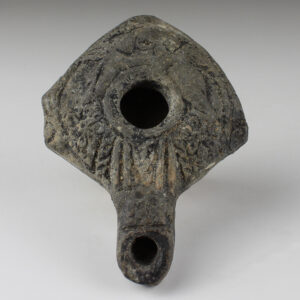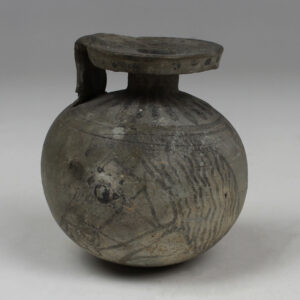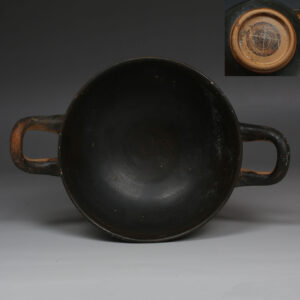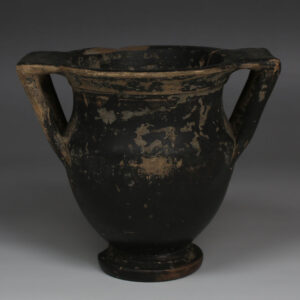Description
| ITEM | Bowl depicting a swan |
| MATERIAL | Pottery |
| CULTURE | Greek, South Italian colonies |
| PERIOD | 4th Century B.C |
| DIMENSIONS | 65 mm x 161 mm diameter |
| CONDITION | Good condition |
| PROVENANCE | Ex American private collection, Colorado, acquired before 2000s |
Greek bowls depicting a swan are captivating artifacts that offer insights into the artistic and symbolic significance of birds in ancient Greek culture. The swan, with its graceful form and elegant presence, held special meaning in Greek mythology and iconography. In Greek mythology, swans were associated with various gods and goddesses, including Apollo, Zeus, and Aphrodite, as well as with figures such as the Muses and the hero Achilles. Swans were often depicted as symbols of beauty, purity, and divine inspiration, and their graceful movements and ethereal presence inspired admiration and reverence among the ancient Greeks.
The depiction of swans on Greek bowls served both decorative and symbolic purposes. These bowls, often made of ceramic or metal, featured intricate designs and motifs representing various aspects of daily life, religious beliefs, and mythological narratives. The swan motif added a touch of elegance and sophistication to the bowls’ aesthetic appeal, transforming them into objects of beauty and artistic expression. Additionally, the swan’s association with divinity and poetic inspiration imbued these bowls with deeper layers of meaning, perhaps serving as vessels for libations or offerings in religious ceremonies or as objects of contemplation and meditation.
The presence of swans on Greek bowls also reflects the interconnectedness of nature and culture in ancient Greek society. Swans were not only admired for their physical beauty but also revered for their symbolic significance and mythical associations.









